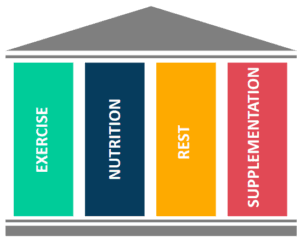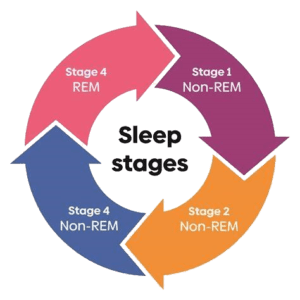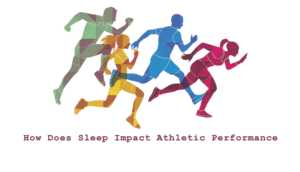At CWPY, we believe that fitness is not just about sweat and exercise, but also about recovery and self-care. With over a decade of experience in the fitness industry, I’ve cultivated a deep understanding of what it takes to excel in athletics. When it comes to coaching, my philosophy revolves around precision in exercise, increasing strength, and power, and maximizing hypertrophy.
I firmly believe in tailoring programs to suit everyone’s unique needs, empowering them to become the best versions of themselves. Outside of the gym, my role as a devoted father has taught me the importance of balance and setting a strong example for my own family and clients alike.
I often talk about the 4 pillars of a successful transformation, which are simple to follow but not always easy. But I know will have an important role in the client’s experience and the outcome.
The first Pillar is obvious, and where many people already know needs work, and it is one of the first things they see in a trainer or coach, and that is TRAINING.
Training should be specific to the goal, based on the current level and position, and should bridge the gap, from where you are to where you want to be, with regular checkpoint KPI reviews to ensure that you are leading down the right path. Which also means adjusting according to what you are not.

The first pillar, EXERCISE, is obvious, and where many people already know needs work, and it is one of the first things they seek in a trainer or coach. Exercise should be specific to the goal, based on the current level and position, and should bridge the gap from where you are to where you want to be, with regular checkpoint KPI reviews to ensure that you are leading down the right path. This also means adjusting accordingly if you are not.
NUTRITION is the second pillar, and this too needs to be specific, based on the goal, body type, and lifestyle, as well as cultural routines, and moral values. There are certain times to eat particular foods, and they all work like a lock and key, so understanding their role is ideal, or having a well-designed nutritional strategy by an expert can be key.
The third pillar is the most overlooked, and one that most of us know we need to apply more of, but often have too many reasons why we don’t, and that is REST. I am going to dive deep into this one in this article and provide you with some science to back up my claims. I am going to focus on the importance of sleep, and how the body needs it to ensure results are met. I could always dive into rest days, which are just as important for adaptation to take place, or even the rest between sets, but what I have learned is that the shorter and sweeter I make these reads, the more my message is understood, and the more likelihood of, YOU, the reader will follow pursuit.
The fourth pillar is SUPPLEMENTS, and it should only come in if the first 3 are in order, then it can have a more positive effect. Again, I will not go deep into this topic, however, there are a few articles on the education section of our website, which are specifically around supplements. Pros and Cons of Nutrition Supplements
why athletes should understand the Science Behind Sleep for their recovery

Let’s dive deep into what happens when we sleep, then I can share with you the quality of your sleep, and how much sleep you need, which should encourage you to ensure this pillar is given the time it deserves, if you are serious about your goals.
The first part of the cycle is non-REM sleep, which is composed of four stages. The first stage comes between being awake and falling asleep. The second is light sleep when heart rate and breathing are regulated and body temperature drops. The third and fourth stages are deep sleep. The cycle then repeats, but with each cycle, there is less time spent in the deeper stages three and four of sleep and more time in REM sleep.
Sleep quality and duration in each stage can be affected by various factors including depression, aging, medications, and circadian rhythm disorders. At the cellular level, sleep is regulated by neurotransmitters such as gamma-aminobutyric acid and neurochemicals like acetylcholine, dopamine, and serotonin.
Though REM sleep was previously believed to be the most important sleep phase for learning and memory, newer data suggests that non-REM sleep is more important for these tasks, as well as being the more restful and restorative phase of sleep. REM sleep is when the eyes move rapidly, and brain waves are like those during wakefulness. Our breathing increases and we become paralyzed. Not sure if you have ever experienced sleep paralysis, where your body goes to sleep, but the mind is fully awake. I have many times, and it is not fun, but an experience to learn from is for sure. There are many other disorders such as sleep apnea, REM sleep disorder, and insomnia, which is a very common sleep disorder, which severely impacts its victims’ lives.
The American Academy of Sleep Medicine organized a panel of sleep experts to create these recommendations. The panel members reviewed hundreds of high-quality research studies about sleep duration and key health outcomes like cardiovascular disease, depression, pain, and diabetes. After studying the evidence, the panel used several rounds of voting and discussion to narrow down the ranges for sleep needed at different ages. The final recommendations have been endorsed by other medical organizations, such as the Sleep Research Society.
Most of us need at least seven hours of sleep a night, this is usually much easier to accomplish for someone like me, who does not mind going to bed early, however, previously, I would not touch the pillow until well after midnight. Some of my clients are “night owls” and find it hard to get up for work, let alone for a fasted cardio session.

Chronotype is the natural inclination of your body to sleep at a certain time, or what most people understand as being an early bird versus a night owl. In addition to regulating sleep and wake times, chronotype influences appetite, exercise, and core body temperature. It is responsible for the fact that you feel more alert at certain periods of the day and sleepier at others. Some researchers postulate that the variation in chronotype might have been a survival technique that evolved in hunter-gatherers. The theory is that by taking turns sleeping, there would always be someone awake to keep watch.
Chronotype can vary from person to person depending on genetics, age, and other factors. Understanding how you are wired may help improve your sleep quality and quality of life. Chronotype does not influence total sleep time.
Scientists consider it very difficult to purposely change your chronotype, though it may shift throughout your life. But the point is, if you are aiming to perform at your best, ideally you should schedule the activities that are the most demanding, or tasks that require more concentration or creativity at times when you can peak.
The Link Between Sleep and Athletic recovery and Performance

Sleep is essential for overall health and well-being. Everyone needs sleep to feel restored and function at their best. Also, as you progress through the stages of sleep, the changes in your heart rate and breathing throughout the night promote cardiovascular health. Sleep duration and quality can help prevent illness, as while we sleep out body produces hormones that help the immune system fight off infections. It is where the body detoxifies itself and reduces inflammation.
Sleep improves our mental state and well-being. When we train, practice, or learn new skills, sleep helps form memories, and contributes to improved performance in the future. Sleep is also essential for cognitive processing. Lack of sleep can have an adverse effect if our job, or sport, requires a high level of cognitive function, such as jumping on a wheel of a breakaway, hitting a ball at a difficult handle, or making a complex play on the court.
A Stanford study of men’s basketball players who extended their sleep to 10 hours a night found several positive outcomes. The players ran faster in both half-court and full-court sprints. Their shooting improved by at least 9%. The athletes also reported improved physical and mental well-being. Male and female swimmers who extended their sleep to 10 hours also saw many performance improvements. Reaction times off diving blocks were faster, turn times were improved, and kick strokes increased. Varsity tennis players, male and female, who increased their sleep to at least nine hours a week also performed better. The accuracy of the players’ serves increased significantly from about 36% to nearly 42%.
While quality sleep has positive effects specifically on athletic performance, a lack of sleep is detrimental to performance. A great number of concerns can arise when we do not receive adequate sleep.
In a study of male team sport athletes who were sleep-deprived, average, and total sprint times decreased. After sleep deprivation, male and female tennis players had decreased serve accuracy by up to 53%. Runners are exhausted faster after sleep deprivation.
Evidence shows that more sleep, or extended sleep, can benefit athletes, their recovery, and their performance. Recommendations for athletes range between seven and nine hours nightly. Elite athletes are encouraged to get at least nine hours of sleep nightly and to treat sleep with as much importance as athletic training and diet.
RECOVERY CONCLUSION
I know after reading this, you may be a little setback, after all, how can you get all the work, all the training, and your life obligations in, and still get seven to nine hours of quality sleep? I know, it is not always possible, but when it is, make the effort, it will improve your efforts for sure.
If early wake times are affecting your sleep, and your optimum performance, consider training at a schedule that best meets your needs. But make sure you ensure this pillar is strong, stable, and in the right place, as to peak performance, we need a solid base, and we can do that by applying the four pillars.
Being a father, a business owner, and an athlete, as well as everything else my life choices bring, time is our biggest asset, and it can be tough to sleep the time we know we need to if we seem to be performing well. But, for us to peak performance and progress, and get the most out of our life, when we are awake, sleep is vitally important.
I know it is hard, especially if you cannot get the required due to work demands, parenting, etc, but, when you can, focus on trying to improve the duration and quality of your sleep, it will pay off in time.
That’s it for now, I am going for a well-deserved power nap, ha ha, only joking, I will have another coffee instead.
Ready to take your fitness knowledge to the next level? Visit our Education Hub, featuring a wealth of resources, including articles, blogs, and videos from our expert trainers and fitness YouTube channel.

